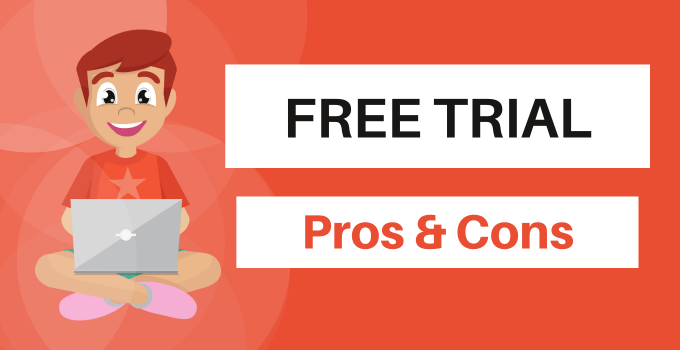When you’re shopping for new software or online services, you’ve probably seen a “Try Free for X Days” or “Sign Up for a Free Trial” button.
It sounds perfect—who doesn’t want to test a service before committing?
But are free trials really worth it, or do they come with strings attached?

Having tried countless free trials myself, I’ve learned a lot about both the benefits and the drawbacks.
Let’s break down the pros and cons of free trial to help you decide if they’re the right choice for you.
Pros of Free Trials

1. Risk-Free Exploration
One of the best things about free trials? They let you explore a product without spending any money!
This is super helpful for expensive software or a new service you’re unsure about.
With a free trial, you can click around, test features, and see if the tool actually works for you – without spending a dime.
2. No Long-Term Commitment
Free trials give you the freedom to explore without committing to anything long-term.
If you like it, great! If not, you can cancel without any trouble.
I’ve found this especially helpful with services like SaaS products that require a monthly fee.
3. Confidence in Your Purchase
By testing the service, you’ll be able to decide if it truly meets your expectations.
This added confidence can make a big difference, especially for services with higher price points.
4. Time to Evaluate Value
By testing the service, you can decide if it truly meets your expectations.
This added confidence can make a big difference, especially for services with higher price tags.
5. Chance to Compare Options
With many services offering free trials, you can try multiple options side by side.
This comparison gives you a real feel for which service meets your needs best and offers the most value.
The Cons of Free Trials

1. Auto-Renewal Traps
A big drawback to free trials is the risk of auto-renewal.
Many companies require your payment information upfront, and if you forget to cancel, you may be charged automatically.
Some businesses even make the cancellation process tricky, hoping you’ll let the trial roll into a paid subscription.
To avoid unexpected charges, it’s a good idea to set a reminder a few days before the trial ends.
2. Limited Access to Features
Some companies limit features or provide only a basic version, which can make it hard to see the product’s full potential.
This limited access can prevent you from experiencing what the service truly has to offer, leaving you unsure if it’s worth upgrading.
3. Time Pressure
Free trials don’t last forever – most only give you 7 or 14 days.
This time pressure can make it hard to fully explore the service, especially if it has a steep learning curve.
4. Hidden Costs
Sometimes, free trials aren’t as “free” as they seem. Some companies might charge setup fees or additional costs that you won’t see until later.
These hidden charges can make the trial period more expensive than expected.
Checking the terms for any mention of extra fees can help you avoid surprises when the trial ends.
5. Frequent Follow-Ups
Companies sometimes use free trials to get your contact info, which can lead to a lot of follow-up emails or calls.
While some reminders are helpful, too many can feel pushy.
I once tried a CRM tool, and even after I decided not to subscribe, I kept getting emails from their sales team.
Using a secondary email address for trials can keep your main inbox free from it.
Other Helpful Guides Related to Free Trial
- What is a Free Trial? A Complete Guide for Beginners
- Which is Better? Risk-Free Trial or Default Trial
How can I avoid unexpected charges from a free trial?
To avoid charges, set a reminder a few days before the trial ends so you have time to cancel if needed.
Do free trials include the full version of the product?
Not all free trials give full access; some only offer basic features. Check what’s included before you start, so you know exactly what you’re getting to test.
Why do companies require payment info for a free trial?
Companies often ask for payment info to make it easy to convert to a paid plan if you want to continue. This can lead to charges if you forget to cancel, so it’s helpful to set a reminder.
How can I decide if a free trial is worth it?
Consider if the product aligns with your needs, then use the trial period to explore key features. A focused approach helps you see if the product is genuinely useful for you.
Are there hidden fees with free trials?
Sometimes free trials come with additional fees, like setup or premium feature costs. Reviewing the terms beforehand can help you avoid surprises and ensure you know any potential costs.
How long do free trials last, and is that enough time?
Most free trials last between 7 and 30 days, which is enough for simpler products. For complex tools, focus on core features first to get a solid feel for the product within the trial period.
Conclusion: Are Free Trials Worth It?

Free trials can be valuable when approached with clear expectations.
Here’s a tip: set a reminder to cancel before the trial ends if you’re not planning to subscribe.
This simple step helps avoid unwanted charges and gives time to make a well-informed decision.
Being mindful of the trial period ensures you get the most out of it.